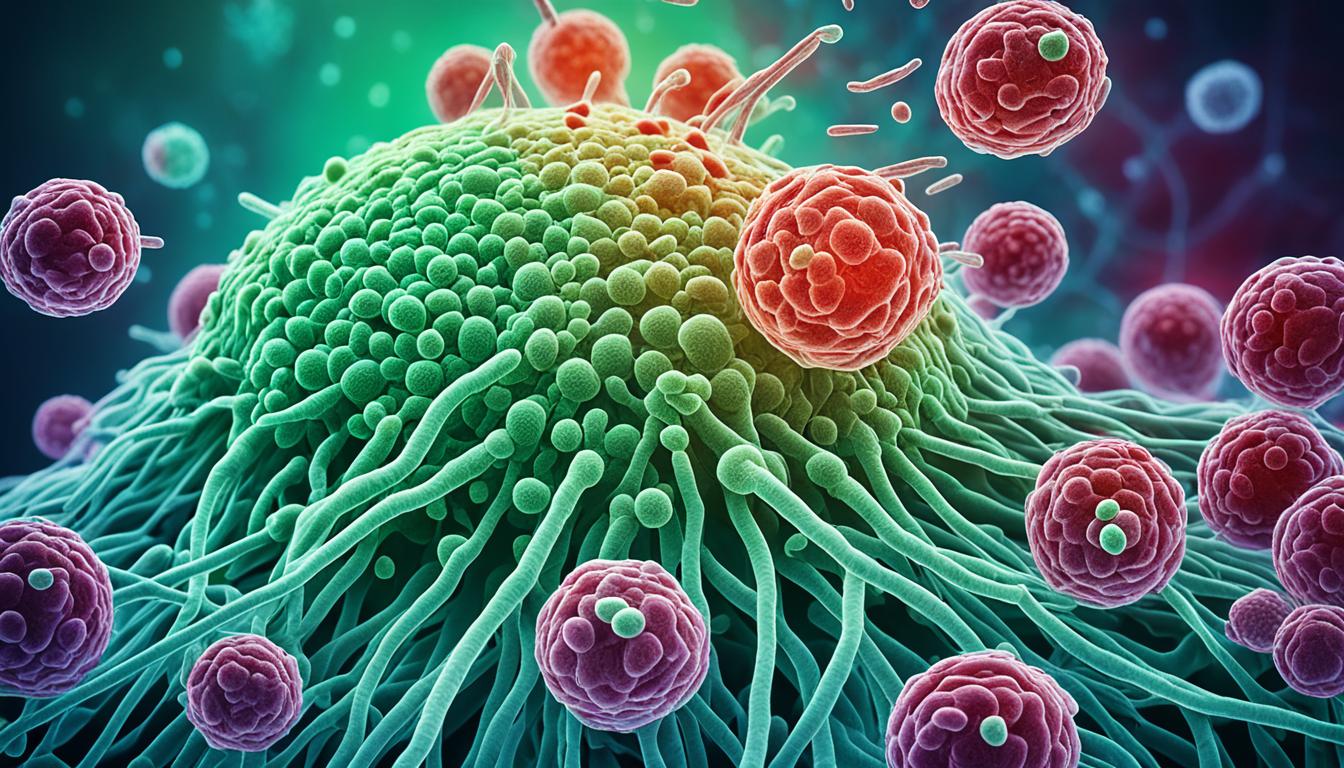Syphilis is a serious bacterial infection. It’s caused by the spirochete bacteria, Treponema pallidum. This infection can look like other diseases, earning it the nickname, the “great imitator”. It moves through four stages.
At first, it can show up as painless sores. Then, a rash appears, followed by swollen lymph glands. You might also feel tired, hot, lose your hair, or have achy joints. It spreads mainly through sex but also through close skin contact or sharing blood.
Safe sex and regular check-ups are the best ways to avoid syphilis. Doctors treat it with antibiotics, usually penicillin G. Sometimes, advanced treatments like stem cell therapy are used.
Key Takeaways:
- Syphilis is a bacterial infection caused by Treponema pallidum.
- It progresses through 4 stages: primary, secondary, latent, and tertiary.
- Symptoms include painless sores, rash, swollen lymph glands, fatigue, fever, hair loss, and joint pain.
- Prevention involves practicing safe sex and regular screenings.
- Treatment usually includes antibiotics, with the possibility of stem cell therapy.
Understanding the stages of syphilis
Syphilis has four stages: primary, secondary, latent, and tertiary. Each stage brings its own symptoms. These can affect how serious the disease gets and hurt your health.
The primary stage of syphilis shows itself with painless sores called chancres. These chancres first appear where the infection entered your body. It could be on your genitals, in your mouth, or around your anus. Because they don’t hurt, you might not notice them.
The secondary stage of syphilis has more visible symptoms. You might see a red or brown rash on your hands and feet. Other signs include a sore throat, swollen glands, fatigue, fever, hair loss, and joint pain. Without treatment, syphilis moves to the next stage.
In the latent stage of syphilis, there aren’t any obvious symptoms. But, the disease is still active inside. It can harm your heart, brain, and nerves. Plus, you can still give syphilis to others during this time.
The tertiary stage of syphilis is the most dangerous. It can show up many years after getting infected. At this point, syphilis can lead to blindness, deafness, mental illness, and heart disease. These are serious health issues that can last a lifetime.
Knowing these stages is key for spotting syphilis early and getting treatment fast. If you think you might have it, or see any symptoms, see a doctor. Early treatment can stop the disease from getting worse and stop serious future problems.
Causes, transmission, and diagnosis of syphilis
Syphilis is an STI caused by the bacterium Treponema pallidum. It spreads through sexual content, skin-to-skin contact, and even blood transfusion. Those with HIV, who have unprotected sex, or many partners are more likely to get syphilis.
Getting tested is key for treatment and stoping the spread. Doctors use blood tests, and sometimes urine or samples from sores. A quick and accurate diagnosis helps right treatment and prevents syphilis from spreading.
The Diagnosis of Syphilis
For diagnosing syphilis, several tests are common:
- Blood tests look for special proteins that show a current or past infection. This helps know the infection’s stage and spot other health issues, like HIV.
- Urine samples might be taken to find syphilis bacteria.
- Fluid or sample tests are done if there are sores. A healthcare provider can test these to confirm syphilis.
If you think you might have syphilis, seeing a doctor is vital. Early detection and treatment stop complications and the infection from spreading.
| Causes of Syphilis | Syphilis Transmission | Syphilis Diagnosis |
|---|---|---|
| Syphilis is mainly caused by the bacterium Treponema pallidum. | It spreads through sexual content, skin-to-skin contact, and blood transfusion. | Doctors diagnose syphilis with blood tests, urine samples, or samples from sores. |
Stem cell therapy and future prospects for syphilis treatment
Antibiotics play a big role in treating syphilis now. But new treatments like stem cell therapy are being explored. Stem cell therapy has shown it can help in many health issues, even fighting diseases. It uses stem cells to fix tissues and organs, which could work well for syphilis too.
When it comes to syphilis, stem cells have a lot of promise. They might repair damage to organs from the infection. This could help organs work again and stop future problems. But first, we need more tests to make sure stem cell therapy for syphilis is both safe and works well.
New ways to treat syphilis are bringing hope. Stem cell therapy is at the front of innovation. It might change how we treat this tough disease. Research is ongoing. Scientists aim to find how to make the most of stem cell therapy. They want to use it to make syphilis treatment better and help patients more.

